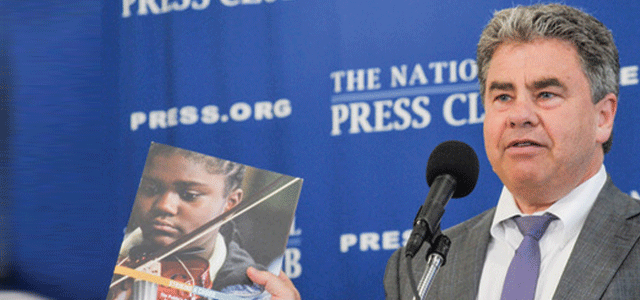
Contrary to state and local pressures to de-emphasize and de-fund music and arts education, a new NAMM Foundation-funded, nationwide study of 1,000 teachers and 800 parents finds strong support for music education at all grade levels. The survey, “Striking a Chord: The Public’s Hopes and Beliefs for K-12 Music Education in the United States 2015,” was unveiled May 19 at the National Press Club during NAMM’s annual DC Fly-In for Music Education. The study finds that strong majorities of teachers and parents say music education is very important, and it should continue to be funded, even at the expense of other programs and classes.
“The data couldn’t be more clear,” said Peter Grunwald, President of Grunwald Associates LLC, the research firm that conducted the survey. “Teachers and parents told us repeatedly that music is an essential part of learning…not merely an ‘extracurricular activity’ that can be cut when times get tough.”
According to the survey conducted this past January and February:
- 77 percent of teachers and 64 percent of parents agree that music and arts education are “extremely important” or “very important.”
- 87 percent of teachers and 81 percent of parents believe children should have a chance to learn to play musical instruments as early as elementary school.
- 63 percent of teachers and 57 percent of parents believe music education should be a required subject in middle school.
“Teachers speak from firsthand experience on what matters to keeping kids engaged in school and learning,” said Mary Luehrsen, Executive Director of the NAMM Foundation. “And nobody is more personally invested in kids’ long-term success than parents. What we see here is that parents and teachers overwhelmingly agree on the importance of providing every child with access to music education in school.”
Here are some additional findings from the online survey:
- Music education is not seen as a luxury, and cuts to music programs are viewed as detrimental to student success. Eighty-three percent of teachers and 73 percent of parents say cutting music education is detrimental for students.
- Parents and teachers would rather cut other programs before cutting music. When asked to perform a drag-and-drop exercise to identify possible cuts in school funding in 15 different areas, teachers and parents found 12 areas they would rather cut than music. School and district administration, standardized testing, athletics programs and even advanced placement classes were all identified as better areas for budget cuts than music education.
- Minority parents are strongly committed to music education. African-American (76 percent) and Hispanic parents (75 percent) are more likely than Caucasian parents (67 percent) to enroll their children in school music classes where opportunities exist.


